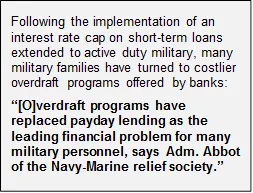
The Unintended Consequences of the Over-Regulation of Short-Term Loans

Some state and federal regulators have called for an annual percentage rate (APR) cap on the fees for short-term loans and/or a limit on the number of cash advances a consumer can borrow each year. These attempts to over-regulate short-term lending harm consumers by eliminating a critical choice for thousands of people who need short-term credit. Consumers’ need for credit does not disappear once these regulations are in place. Instead, they either cannot meet their financial obligations, or they are forced to choose costlier or less regulated options, such as overdraft programs, unregulated loans or bankruptcy.
For these reasons, more than two-thirds (69%) of payday loan users oppose government restrictions on the loans, according to a national poll. The findings affirm the results of a Harris Interactive Survey of payday loan borrowers, which found that 95 percent of borrowers of regulated storefront lenders stated that it should be their choice – not the government’s – whether to use short-term loans.
Consumers face real risks when they are forced to resort to unregulated loans, which are widely available online even in states that have banned short-term loans. Unlicensed lenders offer loans that involve higher, and none of the consumer protections that regulated companies provide. Lenders that operate outside of the jurisdiction of federal and state regulators are not subject to state examinations, lender compliance standards, or formal complaint processes. As a spokesperson for a state chapter of the Better Business Bureau warns, “If we do away with payday loan companies in this state, we are literally pushing the poor to these websites [for unregulated or offshore loans] where they will be, in my opinion, completely taken advantage of.”
In recent years, several states and the District of Columbia have implemented APR caps and other restrictions on short-term credit. Below are some of the unintended consequences states have experienced after limiting or effectively banning short-term lending:
-
Georgia and North Carolina: A Federal Reserve Bank of New York study reported that people “bounced more checks, complained more about lenders and debt collectors, and have filed for Chapter 7 (no asset) bankruptcy at a higher rate” after short-term lending was banned through interest rate caps in Georgia and North Carolina.
-
Arkansas: A 2008 ruling of the Arkansas Supreme Court ended storefront lending in Arkansas. However, the Arkansas Attorney General filed suits in 2011 and 2012 against unregulated online lenders engaged in aggressive collections practices.
-
District of Columbia: An interest rate cap of 24 percent closed all short-term lending operations in the District. Since the closure, officials report an increase in unscrupulous, unlicensed lenders charging as much as 2,000 percent interest, taking payments from a borrower’s checking account without authorization and initiating harassing telephone calls.
-
Montana: Following a 2010 ballot initiative implementing a 36 percent rate cap on all lending, all but 18 of Montana’s 150 short-term lending stores closed. One year later, the Commissioner of Banking reported that complaints against Internet lenders were up substantially over the previous year, with illegal lenders making loans up to 1,000 percent APR.
-
New York: In an effort to crack down on unregulated lenders, the New York State Department of Financial Services ordered 35 lenders to cease lending to state residents in August 2013. Subsequently, the state attorney general filed a lawsuit against an unlicensed online lender and two of its affiliates.
-
Oregon: One year after implementing a 36 percent interest rate cap, 75 percent of Oregon’s 360 short-term lending stores closed their centers. Consumer complaints against unregulated Internet lenders doubled, and nearly 70 percent of such complaints filed in 2010 were against unregulated online lenders.
-
Pennsylvania: During a field hearing on cash advances, CFPB Director Richard Cordray shared a story of a Pennsylvania borrower who struggled with short-term loan debt. However, Director Cordray failed to acknowledge that storefront lending is illegal in Pennsylvania; the customer had undoubtedly borrowed from a lender that was not operating legally in Pennsylvania.
-
Virginia: The state’s Attorney General filed a lawsuit in July 2013 against an unregulated online lender for offering loans without a valid license from state regulators, effectively bypassing state regulations governing interest rates and other loan terms and fees.
-
Washington State: In the first year under an eight-loan limit on cash advances, the number of small loans made to consumers was down 66 percent, while consumer complaints were up 50 percent year-over-year, with 76 percent of the complaints against Internet lenders.
